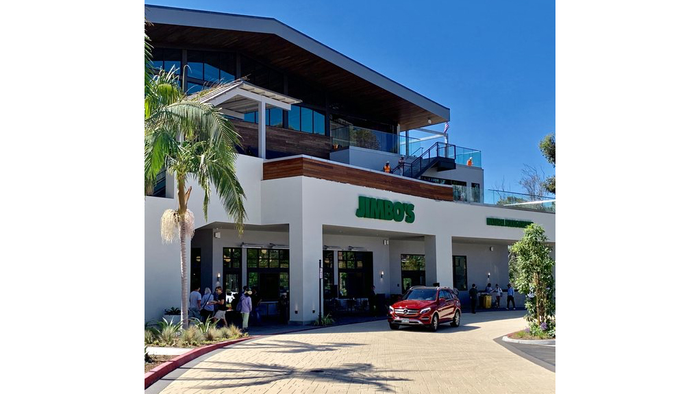June 21, 2024

Though he’s been immersed in the natural products world for a half-century, “I don’t feel that old,” laughs Jimbo Someck, the charismatic owner of Jimbo’s Naturally. Since opening his first store in 1984, he has grown the company to four bustling locations across San Diego County, with a fifth opening planned for 2026.
Someck has certainly seen the industry change over the years, but his values haven’t budged. An early and staunch supporter of organic, non-GMO and regenerative agriculture, he has inspired many other independents to stick to their principles, even when it’s tough. Someck has also encouraged them to join forces, co-founding the Independent Natural Food Retailers Association in 2004.
Here, Someck reflects on the industry’s most significant changes over the years and why he remains as dedicated as ever.
What compelled you to open your own natural products store?
Jimbo Someck: I’d been working at a co-op for 11 years, and I was passionate about the industry and wanted to promote it. When I opened my first store, I didn’t know if it could provide me with a living. But I believed in what it stood for, felt good about selling high-quality organic foods and hoped I could be successful.
Well, you sure have been successful! Jimbo’s turns 40 this year. What are the keys to your success?
JS: One is having a mission you believe in, taking that to heart and making decisions around your mission and values so that you stay the course. We sell only organic produce, only organic bulk, and 99% of our deli is made with organic ingredients. We’ve now moved into regenerative organic being a key component of what we look for. Walking the talk has really endeared us to our customers. They are loyal because they know we don’t deviate from our values. They can trust us, and that has been incredibly valuable.
Also, a lot of great people have been part of the success of Jimbo’s. They’ve been alongside me on this journey for many, many years and helped create and maintain the culture we want. I’ve made my share of mistakes over the years, but they’ve supported me and helped move the needle in the direction we’ve all wanted to go.

Jimbo's Naturally location at Del Mar Highlands Town Center also houses the company's corporate headquarters.
How has the industry changed since 1983?
JS: When I first got into it, the industry was not as high profile as it is now. What was probably looked at as a hippie movement has gone mainstream and become accepted by a lot more people. Now organic foods are not only popular but also seen by many as necessary for the health of individuals and the planet. That has been a great progression for the industry and why it has grown through the years.
Any drawbacks to the industry moving mainstream?
JS: An interesting part of it is that some natural and organic stores have moved toward the middle, carrying more conventional products, and some conventional stores have picked up a lot of natural and organic products—so the lines have really blurred. But as they’ve blurred, we’ve moved more toward the outer edge. We keep pushing the envelope because that’s what we believe in. Our customers see that we’re not bringing in questionable products and know they can still trust us.

Jimbo Someck founded Jimbo's Naturally in 1984.
What other challenges do you face today versus 40 years ago?
JS: One, there is consolidation of distribution. There are two primary distributors, UNFI and KeHE, and we find value in utilizing both. But a lot of the products that we try to be on top of come from small manufacturers. Maybe they’re only sold at the farmers markets and we’re the first to bring them into retail. Then when people at the farmers market ask where else they can get the product, they say Jimbo’s carries it, which helps build our business. But the consolidation of distribution makes it tougher to bring in those products. You have to work more closely with these companies because they may not have the financial wherewithal or movement necessary to get in with a large distributor. So, if you want to support small manufacturers, which we really do, you have to be a lot nimbler.
Another thing is the workforce is a lot harder to fulfill. For the last four or five years and certainly since COVID, it has been challenging to fill all of the frontline positions. We’re fortunate that most of our staff have been with us for years and are very dedicated, but we do have turnover on the front lines. You don’t want to burn out those who are always willing to work longer or pick up shifts, so it’s a delicate balance.
What inspired you and three other independents to co-found INFRA?
JS: As independents, it was really hard to have a voice in the industry. Really, the main voice—even the only voice—was Whole Foods. I give Whole Foods a lot of credit for bringing attention to natural and organic, especially in the 1980s, but I felt like their voice shouldn’t be the only voice. The only way smaller companies could have a voice was to band together and speak as one.
INFRA was a struggle to get going because the four founders had full-time jobs running their own stores. It wasn’t until we hired Corinne Shindelar to run the organization that it became easier to build. I was pretty involved for the first five or six years; I was the first president of the board. I kind of jokingly say that once I took a step back, INFRA began to thrive. Eventually, we got to a critical mass by the number of stores we brought into the fold. INFRA has a large voice in the industry now, and it provides incredible support, especially for small stores and those that may not have the wherewithal or experience to build their businesses.
How does Jimbo’s and other independents stay relevant today and into the future?
JS: Well, I think we’re doing a pretty good job because our comps are significantly better year over year. Our customer base and transaction amount are increasing. We’ve been fortunate. And again, that speaks to us walking the talk, being on the cutting edge, following our mission and doing things that reflect our values. You can’t just open your doors and expect to garner the business you need to be successful—you have to work at it. We need to take care of our staff, take care of our customers and be involved in the communities we serve, and we work really hard at all three of those aspects.
You May Also Like
.png?width=700&auto=webp&quality=80&disable=upscale)

.jpg?width=700&auto=webp&quality=80&disable=upscale)
